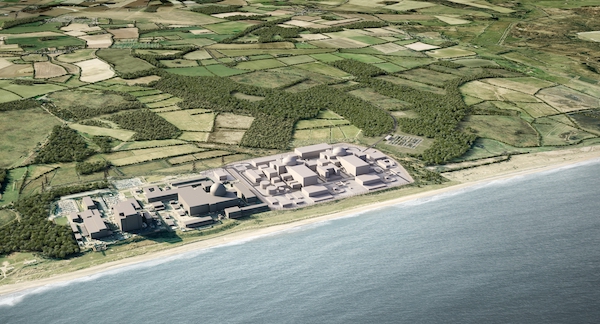 UK Business and Energy Secretary Kwasi Kwarteng has announced £100 million ($134 million) to support the continued development of the Sizewell C nuclear power project in Suffolk.
UK Business and Energy Secretary Kwasi Kwarteng has announced £100 million ($134 million) to support the continued development of the Sizewell C nuclear power project in Suffolk.
The funding will be used to continue the development of the project which will aim to attract further financing from private investors and, subject to value for money and relevant approvals, the UK government.
Ministers have made a commitment to reaching a Final Investment Decision on at least one large-scale nuclear power station this parliament. The Department for Business, Energy & Industrial Strategy (BEIS) said this would provide continuous, low carbon electricity at scale, strengthen Britain’s energy security and reduce our exposure to volatile global gas prices, provided there is clear value for money for consumers and taxpayers.
Negotiations between the government and Sizewell C project developer, EDF, have been ongoing since last year. If built, Sizewell C would power the equivalent of around 6 million homes, as well as supporting up to 10,000 jobs in Suffolk and across the UK.
“In light of high global gas prices, we need to ensure Britain’s future energy supply is bolstered by reliable, affordable, low carbon power that is generated in this country,” Kwarteng said, 27 January.
“The funding announced today will further support the development of Sizewell C during this important phase of negotiations as we seek to maximise investor confidence in this nationally significant project.
The £100 million option fee will be invested by EDF into the project to help bring it to maturity, attract investors, and advance to the next phase in negotiations. In return, the government will take certain rights over the land of the Sizewell C site and EDF’s shares in the Sizewell C company, providing opportunities to continue to develop nuclear or alternative low carbon energy infrastructure on the site should the project not ultimately be successful.”
If Sizewell C reaches a Final Investment Decision, the government will be reimbursed the £100 million option fee with a financing return, either in the form of either cash or an equity stake in the project. If the project does not reach this important milestone, then the government would ask for either the Sizewell C Company shares or the Sizewell C site or, if EDF is unable to provide these assets as requested by government, the money will be refunded by EDF together with a financing return.
He added: “No decisions, including on the final configuration of Sizewell C’s investors, have been made.”
BEIS noted that the UK government is not committed to Sizewell C as a result of this announcement.
EDF Energy CEO Simone Rossi said: “Together with our own investment, these funds will allow us to continue to move the project towards a financial investment decision."
He said that Sizewell C will benefit from being a near replica of Hinkley Point C in Somerset which is more than 5 years into construction and making great progress in the challenging context of the COVID pandemic.
"Sizewell C will provide a huge economic boost to East Suffolk where it already enjoys the support of most local people. It will also bring new opportunities for thousands of nuclear supply chain companies up and down the country."
Nuclear energy financing bill and UK funding for nuclear
The announcement comes as the Nuclear Energy (Financing) Bill, which will enable a Regulated Asset Base (RAB) funding model framework for new nuclear projects, passes through Parliament. RAB could lower the cost of each new large-scale nuclear power projects by more than £30 billion, compared with the existing Contracts for Difference model. It is also expected to reduce reliance on overseas developers for finance by substantially widening the pool of private investors to include British pension funds, insurers and other institutional investors from like-minded countries.
The UK government made up to £1.7 billion of new direct government funding available at the Spending Review for developing a large-scale nuclear project to the point of Final Investment Decision this Parliament project – on top of a £120 million enabling fund to support further nuclear projects and inform potential investment decisions during the next Parliament. In 2021, £210 million was invested into a Rolls-Royce venture to design the UK’s first Small Modular Reactor, pioneering the next generation in advanced nuclear generation.
Photo: The regulated asset base (RAB) funding model is under consideration for future nuclear plants, including Sizewell C (Photo credit: EDF Energy)






